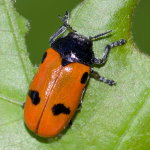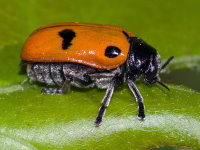Phylum Arthropoda (Arthropods) ➔ Subphylum Hexapoda (Hexapods) ➔ Class Insecta (Insects) ➔ Order Coleoptera (Beetles) ➔ Family Chrysomelidae (Leaf beetles)
Clytra (Clytra) quadripunctata (Linnaeus, 1758)
Vierpunkt-Ameisenblattkäfer Four Spotted Leaf Beetle
Synonyms and other combinations:
Chrysomela quadripunctata Linnaeus, 1758 | Clytra quadrisignata Märkel, 1841 | Clythra appendicina Lacordaire, 1848 |
Classification:
Clytra quadripunctata belongs to the subfamily Cryptocephalinae, tribe Clytrini.Distribution:
Western Palearctic from Western Europe and Morocco east to Central Asia, Afghanistan and Siberia.Habitat:
The warmth-loving Clytra quadripunctata is often found in vegetation near anthills, especially those of the Red Wood Ant.Description:
Length 7,0 - 11,0 mm; elytra orange-yellow to orange-red with black spots; transverse spots narrow, shortened inside and out (The posterior transverse spots may be very small or missing.); pronotum black, clearly dotted, less arched than in Clytra laeviuscula; lateral margin of pronotum broad and wrinkled.Biology:
Adults of the Four Spotted Leaf Beetle can be found in the vegetation around anthills between the beginning of May and mid-July. They feed on pollen, shoots and leaves of various trees and shrubs. Host plants are birch (Betula), hawthorn (Crataegus), willow (Salix) and oak (Quercus).The eggs are surrounded by the females of Clytra quadripunctata with a protective feaces coat and laid on an anthill. The larvae live with ants of the genus Formica, frequently in nests of Formica rufa, with species of the genus Lasius and Camponotus ligniperdus.
The scaly looking egg cases are carried into the nest by the ants. The larvae can also crawl alone into the ants' nest. The egg cases are later extended by the larvae with excrements to the larval bag. If the larvae are attacked by the ants, they can quickly retreat into the larval bag and close it with their horny head plate.
Little is known about the life of the larvae. The larvae are apparently herbivorous and carnivorous. They live from food leftovers of the host ants, prey and have also eaten parts of leaves in the laboratory. They can survive for several weeks without food.
During the moulting they attach their bag to a stable base. The pupation takes place in the upper part of the anthill. The larvae turn around in the larval bag to pupate. After the pupal period, the adults remain in the protective larval bag for another 3 days to harden and leave it through a gnawed, circular opening opposite the original entrance.
After hatching, the beetles immediately go outside to escape the ants' attacks. If the beetles are attacked by ants, they pretend to be dead. They can also shed a secretion when threatened (reflex bleeding). Their smooth chitin shell offers protection against ant bites.
References, further reading, links:
- Rheinheimer, Joachim, & Hassler, Michael: Die Blattkäfer Baden-Württembergs, 2018, 928 pages, Kleinsteuber Books (Karlsruhe), ISBN 978-3-9818110-2-5
- Arved Lompe: Die Käfer Europas - Ein Bestimmungswerk im Internet
- Agrain FA, Buffington ML, Chaboo CS, Chamorro ML, Schöller M: Leaf beetles are ant-nest beetles: the curious life of the juvenile stages of case-bearers (Coleoptera, Chrysomelidae, Cryptocephalinae). In: Jolivet P, Santiago-Blay J, Schmitt M (Eds) Research on Chrysomelidae 5. ZooKeys 2015 (547): 133–164. doi: 10.3897/zookeys.547.6098
- Altica sp.
- Bruchus sp.
- Cassida nebulosa
- Cassida sp.
- Cassida stigmatica
- Cassida vibex
- Cassida vibex/bergeali
- Chrysolina lucidicollis
- Chrysolina oricalcia
- Chrysolina sp.
- Chrysolina sturmi
- Chrysolina varians
- Chrysomela tremula
- Coptocephala sp.
- Crepidodera aurea
- Crepidodera fulvicornis
- Cryptocephalus moraei
- Cryptocephalus nitidus
- Cryptocephalus pusillus
- Cryptocephalus sp.
- Donacia cinerea
- Donacia marginata
- Donacia versicolorea
- Galeruca tanaceti
- Galerucella s.l.
- Gonioctena decemnotata
- Gonioctena quinquepunctata
- Gonioctena sp.
- Gonioctena viminalis
- Lema cyanella
- Neocrepidodera sp.
- Oulema melanopus/duftschmidi
- Oulema obscura
- Pachybrachis sp.
- Phratora sp.
- Plagiosterna aenea
- Plateumaris sp.
- Podagrica fuscicornis
- Psylliodes sp.
- Sphaeroderma sp.
- Gonioctena quinquepunctata/intermedia
- Alder Leaf Beetle
- Ant Bag Beetle
- Barley Flea Beetle
- Brassy Willow Leaf Beetle
- Broad Bean Weevil
- Case-bearing Leaf Beetles
- Colorado Potato Beetle
- Dead-nettle Leaf Beetle
- Elm Leaf Beetle
- Four Spotted Leaf Beetle
- Green Dock Beetle
- Green Tortoise Beetle
- Horseradish Flea Beetle
- Imported Willow Leaf Beetle
- Iris Flea Beetle
- Lily Leaf Beetle
- Plantain Leaf Beetle
- Poplar Leaf Beetle
- Skullcap Leaf Beetle
- Spotted Asparagus Beetle
- Spotted Willow Leaf Beetle
- St John's-wort Leaf Beetle
- Thistle Tortoise Beetle
- Turnip Flea Beetle
- Two-tone Reed Beetle
- Viburnum Leaf Beetle
- Western Grape Rootworm
- Wheat Flea Beetle
- Willow Flea Beetle
- Willow Leaf Beetle

